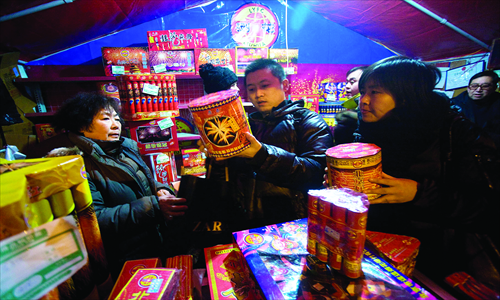No plan for fireworks ban: govt

Despite public support for a temporary ban on Spring Festival fireworks if air pollution levels remain extreme, Beijing environmental authorities have said a ban would be too difficult to implement in the short time before the holiday, which falls on February 9.
Seven news portals and websites, including Sina and Sohu, launched an online discussion Tuesday asking if there should be fewer fireworks in Beijing in light of the recent extremely poor air quality.
By Wednesday evening, more than 3,500 messages have been posted under this topic heading on Sina Weibo and some 1,900 people said they would support a fireworks ban.
In a small survey by the Global Times, 13 out of 20 respondents agreed with a total ban on fireworks during the Spring Festival under any circumstances, but the others were generally in favor of keeping the tradition even though they knew it could harm the environment.
A 31-year-old bank employee, surnamed Wang, said he has not set off fireworks for many years.
"I'm fed up with the smoky air and noisy nights when we are forced to stay awake by fireworks," said Wang.
But Liu Hui, who works in marketing, said it is an important tradition.
"It makes no difference to the environment to ban the fireworks during Spring Festival, which is a short period of time. It's more useful to limit car numbers," he said.
An anonymous official with Beijing Municipal Environmental Monitoring Center said that after intensive fireworks explosions, PM2.5 reaches levels that are harmful to people's health.
The monitoring center detected 1,593 micrograms of PM2.5 per cubic meter at a spot on the city's Second Ring Road after fireworks on Spring Festival Eve 2012, the Xinhua News Agency reported on January 24, 2012.
A media officer from Beijing Municipal Environmental Protection Bureau, surnamed Yang, told the Global Times that the bureau is fully aware of the calls to ban fireworks and research is going on to study this issue, but a ban is not on the cards for this year.
"Banning fireworks requires the cooperation of environmental, police and work safety departments, not to mention we'll also need legal support. All these things can't be done in the next few days," said Yang.
Beijing Fireworks Office confirmed that the schedule for setting off fireworks for 2013's Spring Festival has not been affected yet.
Beijing lifted a 12-year ban on fireworks in the downtown in 2005. This year, fireworks can be set off from February 9 to 24 in designated areas and at certain times, according to the Beijing government website.
Pan Xiaochuan, a professor of public health with Peking University, disagrees with a total ban.
"In good weather, particles from fireworks will soon disperse, and won't harm people's health much. Compared with auto emissions and factory waste, fireworks contribute very little to PM2.5," Pan said.
But He Hong, professor in chemistry and environment industry with the Beijing University of Technology, said fireworks mostly cause PM2.5 rather than heavy metal pollution.
"Fireworks contain aluminum, magnesium and sodium, which are light metals, and won't be highly toxic," he said.
"Heavy metals might be contained in substandard fireworks, which are toxic and can cause pollution," He said.
China's official quality watchdog, the General Administration of Quality Supervision, Inspection and Quarantine announced Tuesday that around 17 percent of fireworks failed to meet the quality standards, Xinhua reported.
Zhang Jinliang, professor with the Chinese Research Academy of Environmental Sciences, said that if the weather forecast shows that smog is likely to form during the festival, the government should include a fireworks ban into its emergency measures, and rigorously enforce it.
"If not, it's better to take a soft way rather than a forceful stand to ban fireworks. The government can publicize the bad effects of setting off fireworks as well as raise the prices so fewer people will buy them," she noted.
Last year, over 170 tons of waste was produced by fireworks on Spring Festival Eve in Beijing, according to Chinanews.com on January 23, 2012.